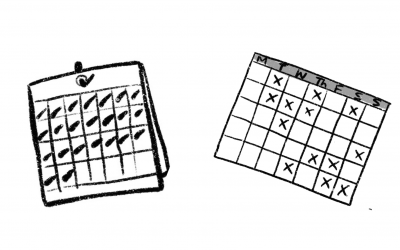I thought I knew about resilience. For the last decade I’ve been studying writing habits and how writers keep going. After a bereavement, I started to see things differently. It turns out I was wrong about what it means to be resilient. This follow up post considers the case against resilience and why the small things help us get through big challenges.
Bouncing back from adversity
Resilience is the ability to bounce back. The word comes from the Latin resilire ‘to rebound’. It helps us to recover from difficulties and adapt in response to adversity, rather than giving up.
Being resilient is not about toughing it out, nor does it stop difficult things happening, but the promise of resilience is that we become stronger, more adaptable and better equipped to deal with the challenges life throws our way.
>> Read more: Start building your writing resilience
The case against resilience
Long term, resilience can lead to growth – even after significant trauma – and help you improve your life. It’s the classic ‘triumph over adversity’ narrative arc we’ve been fed through centuries of storytelling.
Therein lies the problem. The story of resilience is often based on personal responsibility; that it is up to the individual to manage and move past life’s inevitable difficulties.
Founder of the Uncertainty Experts, Sam Conniff, says that putting the onus on the shoulders of individuals is setting us up to fail. The suggestion, he writes, “is that under those strong shoulders, things will get better. The problem isn’t the weakness of my shoulders; it’s the weakness of a system collapsing into a calamitous and unholy mess nearly pulling me under with it.”
Broken systems
Take academic writing. The system is designed to reward productive writers, those with a prolific publication history. It’s transparent about how it operates, especially when academics are applying for tenure or promotion – academics writers know what they have to do to succeed within the system.
Those who fail to publish are punished, hence the brutal ‘publish or perish’ message drummed into early career scholars.
But is it their fault? Not everyone can write, they don’t have the skills or the time, the capacity, the opportunity, the training and support. The system is stacked against them.
And those who succeed – is it their ability that gets them there, good luck, or dare I say it, their privilege?
Many academics don’t reach publication stage. In the UK 30% of people who start PhDs drop out, in the USA the attrition rate is 50%. Every one of those doctoral students had something unique to offer their scholarly community, a new angle, an argument or research on a topic that has now been lost. There’s evidence that those who drop out, don’t do so because of a lack of ability, but often due to structural problems.
Persistence in a failing system
Doctoral persistence is not a matter of sticking with it, of developing resilience. Those with full time jobs, or who study part-time, are more likely to drop out. Yet working is not a choice but a financial imperative for many; those without money are set up to fail.
When one UK university looked at barriers to doctoral education it found: “Financial factors, which restrict students’ educational choices, present one of the most challenging obstacles to accessing doctoral education.” Bundled under non-financial factors, it found that women, Black British students, and those with disabilities experience persistent challenges which influenced PhD completion and their post-doctoral career progression.
Calls for those struggling to become more resilient just won’t cut it. Structural change is needed. Those who benefit from the current system need to do the work to make the system more inclusive and supportive.
“It is no measure of good health to be well-adjusted to a profoundly sick society.”
Jiddu Krishnamurti
The end of resilience?
Stephen Dubner debated this notion with grit researcher Angela Duckworth. He wondered if the calls for self-improvement is actually self-deception. He said:
“I’m wondering if, instead of all of us trying to optimize ourselves — instead of supporting what I think of sometimes as this ‘self-help porn’ movement of podcasts and books — that we should all spend more time optimizing the opportunity set for as many people as possible. Especially people who don’t have the resources or the inclination to pursue this high-end self-help.”
He’s right. We need to work on improving both ourselves AND society. If we’re able, it’s our duty to help others; if we are not – we need to start helping ourselves.
As a fully paid-up member of the self-help porn movement, my skillset is on working with individuals, so I’m going to explore that next.
Creative persistence, grit and resilience
For the last decade I’ve been studying writing habits. I’m fascinated by creative persistence, in short, how writers keep going on projects, especially those that no-one else knows or cares about.
These are projects that you don’t get paid for, that often aren’t valued. These are individual goals with uncertain outcomes, that we pursue even when they cost us, that we make sacrifices for – projects that matter to us for whatever reason. That novel you want to write that might never get published, that blog that might never be read, the PhD hypothesis that might get trumped by another researcher.
To work on these we need grit. Angela Duckworth defined grit as “perseverance and passion for long-term goals.” It shares some traits with resilience but takes a longer-term perspective. So while resilience helps us bounce back from short-term struggles, grit is the tendency to stick with something for the long run and overcome multiple challenges.
>> Read more: How to grow your writing grit and perseverance
How writers keep going
Over the past few weeks I’ve been speaking to writers who have faced challenges, such as the death of a family member or a co-author, those who face ongoing struggles like long-term illness or recurring mental health issues. Writers who get stuck, blocked, who lose confidence when their book is rejected by an agent, when they aren’t published, when sales don’t hit target, when they aren’t read, reviewed or cited, or who face criticism and abuse.
These conversations have deepened my understanding of resilience, what it means to have grit, to persist, to persevere and keep going on challenging goals in difficult circumstances.
One thing struck me from these conversations: when you face big challenges you need to go small. Before you dismiss my generic pep talk to KEEP GOING, YOU’VE GOT THIS, the research backs me up.
Resilience – the ordinary magic
Ann S Masten is a resilience researcher who has spent her career exploring how individuals can survive and adapt despite the most adverse circumstances. While reviewing the findings of longitudinal studies of children who overcome adversity she had a surprising breakthrough. Rather than discovering that resilient individuals were possessed of extraordinary talents and skills, the evidence showed that resilience is common.
Masten’s thesis is a simple one: “resilience arises from ‘ordinary magic’ and it is possible to understand where it comes from and how to foster it.” She provides an optimistic perspective and a practical framework in her book Ordinary Magic.
How to become more resilient
The American Psychological Association offers advice on how we increase our resilience. It suggests four core components:
- Connection – this includes strategies such as prioritizing relationships and joining a group.
- Wellness – having a healthy body (aka self-care), avoiding substance abuse and taking up practices like mindfulness.
- Healthy thinking – accepting that challenges will happen, learning from past experiences and maintaining a positive outlook that embraces change.
- Meaning – being proactive, making progress against your goals, finding opportunities for self-discovery and helping others.
They are so obvious it feels trite. I know it, you know it – sleep, eat, move, be kind to people. We get it.
But as Masten found, it’s the ordinariness that is surprising and which makes resilience possible. With time and intention we can become stronger. She uses the analogy of resilience in engineering. Think of the example of how sky scrapers are designed to endure earth quakes. I’ve previously written about flood resilience and how my town has adapted buildings to recover from ever increasing floods.
>> Read more: How to write in challenging times – the alchemy of gentle productivity
Simple steps to resilience
I spoke to Manuela Hartwig who researches community disaster resilience in Japan. As a writer, she felt that resilience means being able to cope with external factors (or stressors) that she cannot control. She told me:
“Resilience is developing a proactive mindset to not get overwhelmed by these external, and sometimes devastating life circumstances. It can be as simple as accepting bad days or unproductive days and just going back to writing the next day without falling down a vicious cycle of guilt for not having written something in a day.”
Hartwig’s use of the word ‘simple’ sums it up. When the big things happen, it’s the small approaches that make the difference.
>> Read more: Grief induced writer’s block – how to get through it
Reset – finding my factory settings
That’s exactly what I found when my father’s death knocked me off course. I needed to reset myself. It was like restoring factory settings and I realised my settings are pretty simple. There’s no bells and whistles or big interventions. I just had to start again, from scratch.
I had to return to work, I needed the money, but I found that scheduling calls and meetings gave me a purpose, even more so as I do a lot of coaching which is focussed on other people. Helping them, helped me.
I worked in small chunks of time. With an old-fashioned hourglass timer on my desk, I set the intention to concentrate, to put my attention on work, just 15 minutes, I promised myself. I turned the timer for the sand to fall for another quarter hour.
I started working on a novel, a side project that had fallen by the wayside. I went back to the blank page. A few minutes each day. A few words. Each small step helped me make progress on a personal goal. I joined an accountability group for support. I took a lot of naps.
All of these were so simple that like Masten’s breakthrough with ordinary magic they transformed my understanding of resilience. Forget willpower, sticking with it, developing an iron will or trying hard to keep going. The power of resilience is small and connected to others.
[et_bloom_inline optin_id=optin_7]




